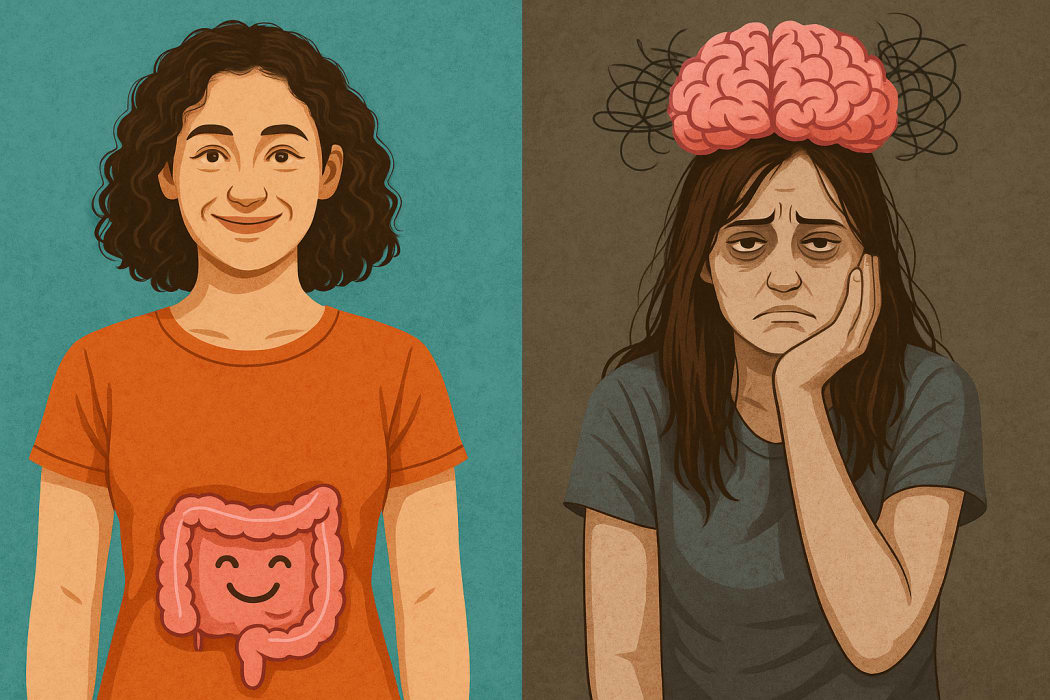The Gut-Brain Connection: How Your Gut Health Controls Your Mental Health (2025 Guide)
How Modern Life Destroys Your Gut
We’re living in a microbiome-hostile environment. Here’s what’s making it worse:
🚫 Dietary Disruptors
Processed foods with preservatives and emulsifiers
Excess sugar (feeds bad bacteria)
Artificial sweeteners (disrupt microbiome balance)
Low fiber intake (starves beneficial bacteria)
⚠️ Lifestyle Factors
Chronic stress (raises cortisol, lowers beneficial bacteria)
Overuse of antibiotics and NSAIDs
Poor sleep patterns
Sedentary routines
☣️ Environmental Toxins
Chlorinated tap water
Pesticide-laden produce
Endocrine disruptors from plastic containers
Dr. Emeran Mayer of UCLA warns that we’ve lost up to 40% of ancestral microbiome diversity in just 3 generations.
5 Evidence-Backed Ways to Heal Your Gut (And Brain)
1. Eliminate Gut Killers (72-Hour Reset)
Remove sugar, sweeteners, and processed foods
Replace with whole, fiber-rich foods
Impact: Boost good bacteria, reduce inflammation
2. Add One Fermented Food Daily
Examples: kefir, kimchi, miso, sauerkraut
Benefits: Replenish live probiotics, improve mood
3. Walk After Meals
Just 10 minutes post-meal
Enhances digestion and vagus nerve tone
4. Hydration Protocol
16 oz water first thing in morning
8 oz before meals (not during)
Hydrated gut = better digestion and mood regulation
5. Track Your Bowel Movements
Goal: 1–3 well-formed (Bristol Type 3–4) stools per day
Red flags: chronic diarrhea, constipation, blood, pain
The Complete Gut-Mental Health Protocol
📅 Phase 1: Detox & Reset (Week 1–2)
Cut processed foods, refined sugars, sweeteners
Eliminate alcohol, NSAIDs (if medically safe)
Drink filtered water
Eat home-cooked meals
🌱 Phase 2: Rebuild (Week 3–6)
Add prebiotic-rich foods (onions, garlic, oats, bananas)
Include fermented foods (kefir, yogurt, kimchi)
Take multi-strain probiotic (25–50 billion CFUs)
Supplement with L-glutamine, omega-3, vitamin D
💪 Phase 3: Optimization (Month 2+)
Try intermittent fasting (14–16 hours)
Practice circadian eating (no food 3 hours before bed)
Meditate or do breathwork 10 min/day
Aim for 7–9 hours of sleep, same schedule daily
Eat 30+ plant-based foods weekly
What Is the Gut-Brain Axis?
The gut-brain axis is the two-way communication system between your digestive system and your central nervous system. It’s powered by a mix of:
The vagus nerve (a massive nerve superhighway that connects gut to brain)
Your immune system
Hormones and neurotransmitters
The enteric nervous system (often called the "second brain")
This axis allows your gut to talk to your brain—and vice versa. In fact, studies show that more signals travel from your gut to your brain than the other way around.
But here’s the twist: the gut isn’t just sending information. It’s producing key brain chemicals, like:
Serotonin (90% of it is made in your gut)
Dopamine
GABA
These chemicals affect your mood, behavior, and mental clarity. If your gut is inflamed, imbalanced, or overwhelmed, your brain pays the price.
Why Gut Health Impacts Mental Health
Your gut is home to trillions of bacteria, fungi, and viruses—collectively called the gut microbiome. When this ecosystem is healthy and diverse, it supports optimal brain function. But when it's out of balance (a condition called dysbiosis), it can contribute to mood disorders, anxiety, and even neurodegeneration.
Key Mechanisms:
Neurotransmitter Production:
Bacteria like Lactobacillus and Bifidobacterium help produce serotonin, GABA, and dopamine.
Inflammation and Immune Activation:
Bad gut bacteria can trigger chronic low-grade inflammation, which increases risk of depression and cognitive decline.
Vagus Nerve Activation:
Gut bacteria stimulate vagus nerve signals that directly influence mood, behavior, and emotional regulation.
Leaky Gut & Blood-Brain Barrier Disruption:
A compromised gut lining can allow inflammatory substances to enter the bloodstream, affecting the brain.
Harvard Medical School’s 2024 study showed that individuals with a rich, diverse gut microbiome had 40% lower rates of depression and anxiety compared to those with poor gut diversity.
Latest Scientific Evidence (2023–2025)
✅ 2025 – Nature Communications Longitudinal Study
Participants: 2,100 people over 5 years
Findings:
Higher microbiome diversity =
45% lower depression rates
38% better cognitive function
52% fewer anxiety disorders
Top Predictor: Diversity of plant-based foods in diet
✅ 2024 – Harvard Clinical Study
Study Type: Mediterranean diet + probiotic intervention
Participants: 847 adults with moderate anxiety
Results:
40% anxiety reduction
60% better sleep
More GABA-producing bacteria
✅ 2023 – Meta-analysis in Molecular Psychiatry
Data from: 42 randomized controlled trials
Result:
Probiotics reduced depression scores by 35%
Key strains: L. helveticus R0052, B. longum R0175, L. casei Shirota
Signs Your Gut Might Be Affecting Your Mental Health
Mental Symptoms:
Brain fog
Low motivation
Anxiety or panic
Irritability
Mood swings
Depression
Physical Clues:
Bloating, constipation, or diarrhea
Sugar cravings
Fatigue even after sleep
Trouble falling or staying asleep
A 2023 analysis found that 78% of people with anxiety also report digestive symptoms, compared to only 23% of the general population.
Tools to Track Your Gut & Mood
🧠 Apps:
MyFitnessPal: Track fiber and probiotics
Cronometer: Nutrient breakdowns, especially for gut supplements
Cara Care / Symple: Track symptoms and food triggers
🧪 At-Home Tests:
Viome: Gut RNA test + food recs
Thryve: Microbiome sequencing + custom probiotics
DayTwo: Gut-based blood sugar response and food suggestions
Conclusion: Your Gut Is Your Mood Regulator
Mental health isn’t just in your head—it’s in your gut. From neurotransmitters to inflammation to nervous system signaling, your digestive system plays a central role in how you feel, think, and cope.
Key Takeaways:
90% of serotonin is made in your gut
Gut bacteria shape anxiety, depression, and cognition
Simple changes in diet and routine can reset your gut-brain axis
This isn’t alternative medicine—it’s the future of mental health.
Start with one small step today. Add a fermented food. Walk after your next meal. Track your mood for a week. And remember: when your gut heals, your mind follows.
Tags: gut-brain-connection, gut-health-mental-health, probiotics-anxiety, fermented-foods-mental-health, microbiome-repair, brain-fog-causes, serotonin-gut, natural-anxiety-cures, holistic-mental-health
Harvard Health – The Gut-Brain Connection
https://www.health.harvard.edu/diseases-and-conditions/the-gut-brain-connectionHarvard Health – Probiotics May Help Boost Mood and Cognitive Function
https://www.health.harvard.edu/mind-and-mood/probiotics-may-help-boost-mood-and-cognitive-functionNature Communications – Gut Microbiome-Wide Association Study of Depressive Symptoms
https://www.nature.com/articles/s41467-022-34502-3ScienceDaily – Harvard Scientists: Gut Bacteria Fuel Inflammation & Depression
https://scitechdaily.com/harvard-scientists-uncover-how-gut-bacteria-fuel-inflammation-and-depression/Stanford Medicine – The Gut-Brain Connection: Long COVID, Anxiety & Parkinson’s
https://med.stanford.edu/news/insights/2025/03/gut-brain-connection-long-covid-anxiety-parkinsons.html
